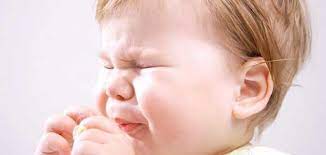Does your child suffer from a persistent cough? Do you feel a strange sound inside his chest when he coughs at night? Does coughing affect his activity during the day? Does phlegm affect his breathing? In this article, we will discuss the most important causes of cough and how to treat phlegm in infants by following some home instructions.
Coughing is a defensive reaction of the chest against the attack of microbes and germs into the respiratory tract. However, there are several types of cough that have been summarized in two forms.
Dry cough
It is the first form of cough and appears at the beginning of the infant's illness with a cold or chest infection. The cough may remain in the same form until the cold or flu ends or turns into the second form.
Chest cough
It is the second form of microbe development in the lower parts of the respiratory system, and it results in the appearance of phlegm, which is a substance that contains bacteria and germs that caused the cold, and then the chest gets rid of it through coughing to push these microbes out and get rid of them.

Chest cough
Although cough is difficult for adults and cannot be tolerated many times during sleep, it is difficult to get rid of in infants and children, and families are always confused about how to get rid of cough.
Causes of coughing with phlegm
Causes of cough differ from causes of phlegm and include the following:
- the cold
A cold can cause other symptoms besides cough, such as runny nose, sneezing, sore throat, red and runny eyes, in addition to general lethargy in the body.
- Allergies
Some chest or food allergies can cause phlegm to appear when coughing, along with other symptoms including skin rash, runny nose, sneezing, sore throat, and eye redness as a result of exposure to dust or pollen.
- Chest infection
In some cases, respiratory infections associated with the common cold can cause symptoms including shortness of breath, fever, green or yellow phlegm, and chest pain.
When should you consult a doctor?
Some cases may not require consulting a doctor and just take cough medications from the pharmacy under the supervision of a pharmacist. However, there are some cases that require immediate consultation, including:
- If the infant is less than 4 months old.
- The cough continues for at least two consecutive weeks.
- Cough affects the infant's comfort during sleep.
- The infant cannot breathe regularly during sleep.
- shortness of breath.
- If he suffers from chest allergies
- If the breathing rate is faster than normal.
- The infant's lips or face turn blue.
- If he suffers from any respiratory or heart disorders.
- If he was born with any birth defects.
- Dry body.
- High body temperature or fever.
Treatment of phlegm in infants
Phlegm can be treated by following natural instructions at home, in addition to taking medication under medical supervision to achieve the best result as quickly as possible and get a restful sleep at night.
Home recipes
Home recipes to get rid of cough and treat phlegm for infants cannot be overlooked, and these include:
- Drinking warm water in the morning makes it easier to get rid of phlegm.
- Drinking warm natural herbs such as anise, caraway and fennel helps dissolve phlegm and facilitate its exit.
- Drink warm mint and try to inhale it every now and then to moisten the nose.
Drug treatment
Some expectorant medications can be used in addition to anti-cough syrups to calm the cough. In cases of allergies, it is preferable to give antihistamine syrups to avoid the continuation of the cough for long periods, after consulting a doctor.
Home instructions
Some home guidelines help avoid phlegm in infants for long periods, such as:
- The infant's head should lie on a higher surface than the rest of his body to avoid choking on phlegm when he sleeps.
- Use air regulators in bedrooms to avoid dryness of the air around the infant.
- Avoid running air conditioners at cold temperatures as this increases the dryness of the child's nose during the day.
- Breastfeed regularly.
- Use drops or nasal spray containing sea water every now and then to avoid dry nose when waking up or while sleeping.

- Bathing with warm water because it helps inhale the vapors, which in turn keeps the nose moist.
- Rinsing the nostrils with saline solution helps eliminate nasal dryness and dissolve phlegm.
- Massage the infant's chest every now and then using light aromatic oils to help relax him and reduce the severity of the cough before bed.

